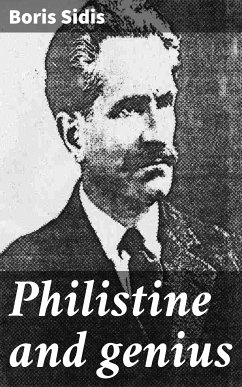In "Philistine and Genius," Boris Sidis explores the intricate relationship between societal norms and individual creativity, posing deep questions about the nature of genius in a conformist culture. The book is characterized by Sidis's analytical rigor combined with a lyrical prose style, illuminating the often adversarial dynamics between the 'Philistine' class'-those who adhere to conventional values'-and the 'genius' individuals who challenge these paradigms. Drawing upon psychological insights and cultural critique, Sidis contextualizes this conflict within the framework of early 20th-century intellectual discourse, thereby offering a profound examination of how society cultivates or stifles innovation. Boris Sidis, a pioneering psychologist and educator, was heavily influenced by his own experiences navigating the academic landscape and observing the broader societal constraints placed on enlightenment thinkers. His background in experimental psychology and his endeavors in education informed his perspective on the often precarious position of genius amid rigid social structures. Sidis's multifaceted approach reflects both his commitment to understanding the cognitive processes behind creativity and his advocacy for an educational system that nurtures individual talents. "Philistine and Genius" is an essential read for those interested in psychology, education, and the arts, as it offers valuable insights into the forces that shape human potential. Readers will find themselves challenged to reflect on their own encounters with societal norms and the value of creativity in fostering progress. This work stands as a testament to the necessity of embracing genius in a world increasingly threatened by mediocrity. In this enriched edition, we have carefully created added value for your reading experience: - A succinct Introduction situates the work's timeless appeal and themes. - The Synopsis outlines the central plot, highlighting key developments without spoiling critical twists. - A detailed Historical Context immerses you in the era's events and influences that shaped the writing. - A thorough Analysis dissects symbols, motifs, and character arcs to unearth underlying meanings. - Reflection questions prompt you to engage personally with the work's messages, connecting them to modern life. - Hand-picked Memorable Quotes shine a spotlight on moments of literary brilliance. - Interactive footnotes clarify unusual references, historical allusions, and archaic phrases for an effortless, more informed read.
Dieser Download kann aus rechtlichen Gründen nur mit Rechnungsadresse in A, B, BG, CY, CZ, D, DK, EW, E, FIN, F, GR, H, IRL, I, LT, L, LR, M, NL, PL, P, R, S, SLO, SK ausgeliefert werden.









